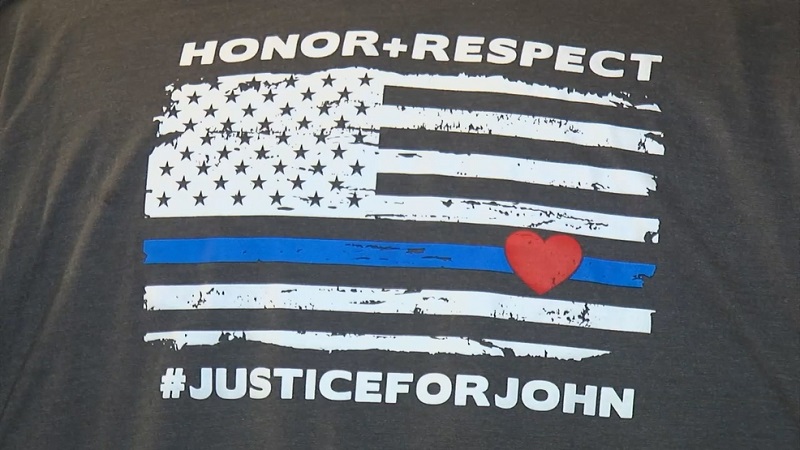
By Steve Pomper

This follow-up about Blackwell Police Department (Oklahoma) Lt. John Mitchell’s seemingly never-ending court case. The NPA has been covering since December 2019. It’s a terrible odyssey that began in May of that year and is still sputtering along today because of a turd of a DA who won’t drop it. Yes, this will be the fourth Christmas under this undeserved shadow.
Lt. Mitchell’s appearance on the Failure to Stop Podcast, with Mike the Cop and Eric Tansey, prompted me to do a follow-up. Though I was familiar with the story, having written about it for a couple of years and have spoken with John, his attorney, and the state’s FOP president, hearing Lt. Mitchell go over the entire grueling ordeal angered me—more than I already am.
Here’s a quick what happened: Lt. Mitchell helped end an active mobile shooter incident. The suspect was driving her pickup through Blackwell, shooting at people, including her mother and the police. With remarkable skill, courage, and professionalism, Lt. Mitchell’s actions helped end her rampage with no innocent victims injured or killed.
Tragically, DA Jason Hicks ended up with the case and inexplicably he has treated Lt. Mitchell as if, as one of the podcast hosts, Eric Tansey, joked, he’d slept with the DA’s wife. Why this DA has such a vendetta against Lt. Mitchell, no one seems to know for sure. He seems stuck on the fact the LT. fired some 60 rounds during the confrontation.
The number of rounds fired by officers was the precise number of rounds needed to end the danger. We know this because the suspect didn’t stop being dangerous until after the last bullet was fired.
If you get a chance, read some of the NPA’s coverage. But if you’ve got a bit more time, check out this podcast, as Lt. Mitchell gives you his firsthand account. I plucked some nuggets out of Lt. Mitchell’s interview, and I’d like to share them.
It’s not only about Lt. Mitchell being a hero but also that this rogue DA would put a cop like this through this torment after risking his life for his community.
Lt. Mitchell’s story pointed out something people don’t understand about a cop’s job. Before this shootout, Lt. Mitchell had been at a youth baseball league function. Getting to know him even a little bit, I’ve noticed that most of his social media postings have to do with youth athletics, to which he is obviously devoted. The league meeting ended late, but when he got home, he chose to watch a Game of Thrones episode rather than go right to sleep.
No, before the shooting, he wasn’t busy planning how to kill someone at work.
By 3 a.m., the lieutenant had received a call about the active shooter, changed, and was in his patrol car headed toward the shooting. He literally went from a baseball meeting, to watching TV, to a life and death shootout in the middle of the night. Sometimes, that’s how it works for cops.
Lt. Mitchell explained he’s since learned deputies at a neighboring agency had disarmed the shooting suspect during an incident the previous year. They said she was suffering from a mental health crisis. It was the same gun.
Lt. Mitchell’s case demonstrates many of the public servants tasked with prosecuting a cop for alleged crimes have no idea what law enforcers do. Immediately after the shooting stopped, Lt. Mitchell, an active shooter training instructor, had informed other officers about what he had done during the incident, including an estimate of how many rounds he’d fired.
The DA, rather than learn about why Lt. Mitchell said what he did, exploited his words and actions to disparage the lieutenant and initially charge him with murder. For example, he criticized Lt. Mitchell for “bragging” (yelling) about how many rounds he fired.
The lieutenant pointed out that he’d been firing his firearms from inside his car. His adrenaline was high, and he was nearly “deaf” at that point, both of which could account for his excitement and yelling.
He was also criticized for telling officers not to talk about the incident. Having taught the course, Lt. Mitchell emphasized the biological effects on a human being after a stressful incident. Though the timing of interviews can be controversial, some research finds that officers should wait and be well rested before attempting to recall details of a high-stress incident.
Many (probably most) officers have been forced to provide statements on their account of a high-stress incident immediately following the incident. There is something to be said about having a fresher memory. However, it’s different with high intensity situations. Adrenline can affect how a person thinks at a stressful time.
I remember a robbery I helped investigate at a gas station. After deciding we were going to impound the suspect’s car, we inventoried the trunk. Later the suspect challenged it as an illegal search. I had to write a statement about my part in the inventory.
I wrote that I’d touched nothing in the trunk an only looked into it, observing what was there. Well, reviewing the video, there I was, casually picking up a loose piece of rope lying in a box in the trunk. I would have sworn I touched nothing. And this wasn’t even very high stress at that point.
However, if that part of the incident had been a part of a court case, could a nasty prosecutor have charged me with giving a false statement? That’s what’s happened to an awful lot of officers on much more serious cases.
Lt. Mitchell went on to describe losing 60 pounds during this protracted and vicious prosecution. He said he was unsure if PTSD or some other psychological effects had caused the weight loss. He explained how in the beginning he knew Hicks was going after him even though others told him he was being paranoid. No one imagined they’d charge him with a crime for saving lives.
At the grand jury, Lt. Mitchell said they made him sit in a room alone for eight hours. He said he could hear who he thought was the DA in an adjacent room, “laughing and joking.” He said who he thought was the DA asked what cases were available. They told him about one with a cop charged with second-degree murder. Lt. Mitchell said he heard the man say something like, “let’s take this one. It should be fun.”
Later, when interviewed, the grand juror they chose to question Lt. Mitchell asked if it was true he’d beaten up a woman with cancer. From that moment on, he knew they were gunning for him.
Later, Mitchell told a heartbreaking story about when he had to call his wife to let her know the DA and grand jury were going to indict him for murder. He said it was especially tough because they had a nine-year-old daughter who died in 2013. She had spent her life on a respirator with 24-7 care from him and mostly his wife while he was at work. He recalls carrying her lifeless body to the hearse outside when she died.
After that, he never again wanted to deliver any devastating news that would affect their family like that. He had to tell his wife but was also despairing over how to tell his boys he was being charged with murder. Up to that point, he’d only received praise and awards for what he’d done that day.
He noted that, recently, unable to get help from inside the office, the DA has hired several outside attorneys who, after reviewing the case, have decided they won’t touch it.
Why is this DA so vindictive? That’s a question everyone who hears about the case asks. And no one, even John Mitchell, seems to have any specific answers. The closest is speculation is the DA thought he could “make a name for himself” by prosecuting a cop.
Before closing the interview, Lt. Mitchell encouraged any officers listening to the show not to hesitate to contact him if they were going through anything like this. He said, “get ahold of me. Get help.”
That’s just another example of the John Mitchell I’ve come to know over the years.